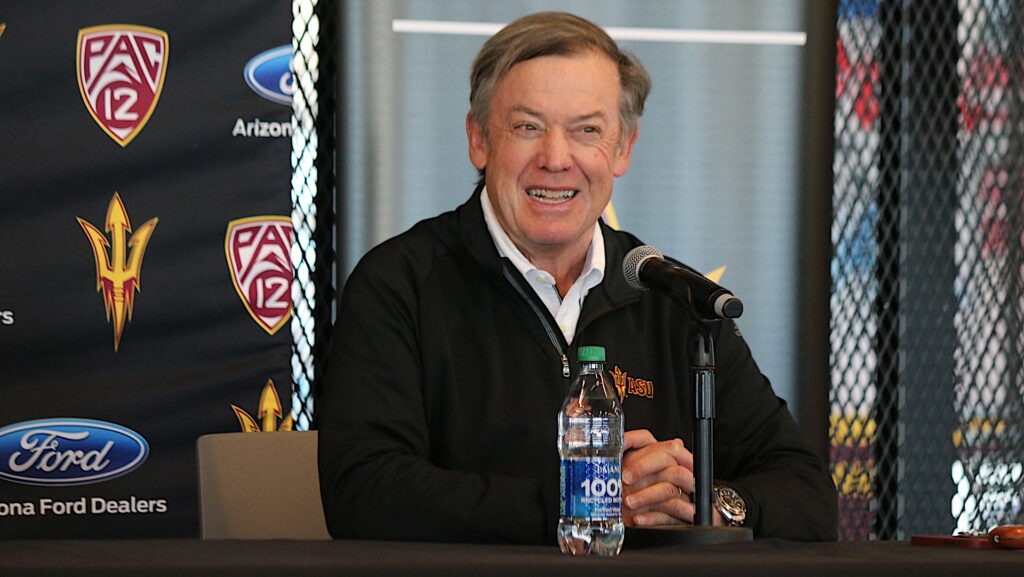Arizona needed less than a month to hire an athletic director. Dave Heeke was dismissed on Jan. 23, and Desiree Reed-Francois was appointed on Feb. 19. Zero fuss, zero muss and one terrific choice by the Wildcats.
Meanwhile, Arizona State is taking its sweet time. How much time? Well, Ray Anderson announced his resignation in the middle of November, and the Sun Devils have not named his successor.
In fact, they don’t appear close, according to multiple industry sources.
The contrasting timelines perfectly reflect the disparate approaches to athletics taken by the two university presidents.
Arizona’s Robert Robbins is highly engaged, to the point that he was viewed as the de facto athletic director during Heeke’s tenure.
Meanwhile, Arizona State’s Michael Crow has a reputation for being disengaged from athletics, as we wrote in an assessment of the two schools in late January.
Crow took exception to our conclusions in that column and, in an email sent unsolicited to the Hotline, said our analysis of ASU “isn’t picking up on the why and the what of (what) we have been attempting to do.”
He then pulled back the curtain on ASU’s hiring strategy.
“We are making some design changes and updating our models for operations and systems before we make a decision on a new AD, so it is for us a careful and deliberate process,” Crow wrote.
“ASU is in a great community, a great institution, it is a complex and exciting job, and we will find a great AD.”
Indeed, the Sun Devils should have a strong candidate pool when the search reaches its final stages. The job is considered an A-level position in major college athletics because of the location, expected salary (relative to cost of living) and resources available. Also, because Anderson’s dismal performance creates upside potential for his successor.
In his email, Crow noted that the Sun Devils have “invested more than $500 million in our athletic facilities recently, started a few new sports, started breaking world records again in swimming.”
That massive investment in facilities includes a renovation of Mountain America Stadium — it will always be Sun Devil Stadium to us — but, conspicuously, not Desert Financial Arena, home of the men’s basketball program.
The venue is about to turn 50 and in desperate need of an upgrade, as even Anderson acknowledged during a radio interview in November: “We need to upgrade Desert Financial Arena. That’s no secret to anyone. We haven’t been able to get that done yet.”
Crow’s email didn’t address DFA specifically or coach Bobby Hurley’s job status. Nor did he address the struggling football program, which was 3-9 under first-year coach Kenny Dillingham and is expected to be sanctioned by the NCAA for a major recruiting scandal under Anderson’s watch.
In terms of competitive performance, Crow simply noted that the Sun Devils are “doing well in a broad range of sports and still searching for the right combination in others.”
He did, however, emphasize that Arizona State is “performing in the top two or three Pac-12 schools academically for athletes,” was recently elected to the Association of American Universities — that’s a big deal in higher education — and has “found a way for our students to be highly engaged as fans and significant investors in ASU athletics.”
Crow also acknowledged that Arizona State, like so many of its peers across the country, is grappling with the rapidly shifting landscape of college sports.
Dartmouth’s basketball players are scheduled to vote today on whether to unionize.
Numerous lawsuits are challenging the NCAA’s economic model and could result in a revenue-sharing arrangement between the schools and athletes.
The courts are dismantling the NCAA’s policies governing the transfer portal and name, image and likeness.
The SEC and Big Ten have gained unprecedented influence over major college football and have hinted they might consider breaking away from the rest of Division I.
College sports is roiling like never before — all while ASU prepares to enter the Big 12 this summer without an athletic director.
Crow cannot swing and miss. The department needs a leader who understands ASU’s challenges and can position the Sun Devils to thrive in whatever version of college sports comes next.
He offered the following as a way of illuminating his broad strategy:
— “Can you build and maintain college sports as college sports? Not professional sports at colleges.
— “Can student athletes be treated better, and like other students (NIL for instance) and still be student athletes?
— “Can student athletes have better life outcomes, regardless of their incoming family circumstance?”
In our examination of the Sun Devils and Wildcats in late January, the Hotline noted a marked difference in university support for athletics between two schools within the same university system — two schools with the same board of regents.
Over a five-year, pre-pandemic period, ASU’s athletic department received an average of $23 million in campus support (approximately) while Arizona athletics collected an average of $13 million from central campus. (Note: Figures taken from USA Today’s database on college athletic finances.)
Crow addressed the issue of university support, as well, in his email.
“We are operating ASU athletics in a way where it is an integral part of the university, not an add on, or an addendum,” he wrote. “Meaning, what you call university subsidy is something that to us is no different than how we operate the rest of the university financially.
“Some units cover the costs, some don’t. All are just a part of the university and help it to be successful overall.
“We now have 80,000 students on campus from all 50 states and 158 countries, more than 950,000 people that have attended ASU and are still alive, and ASU athletics is a key element of our community.
“Our teams have played all over the world, our athletes come from everywhere, and our community supports them and are interested in their success.”
That same community is awaiting the appointment of a new athletic director, as well.
*** Send suggestions, comments and tips (confidentiality guaranteed) to pac12hotline@bayareanewsgroup.
*** Follow me on Twitter: @WilnerHotline
*** Pac-12 Hotline is not endorsed or sponsored by the Pac-12 Conference, and the views expressed herein do not necessarily reflect the views of the Conference.
Related posts:

(AP Photo/Marcio Jose Sanchez)
Wilner Hotline: Arizona State Under the Microscope vs BYU, Week Three Preview Wilner Hotline: Eight need-to-knows for Week Nine of Pac-12 football
Wilner Hotline: Eight need-to-knows for Week Nine of Pac-12 football

Arizona center Oumar Ballo (11) goes to the basket in front of Arizona State guard Devan Cambridge (35) (AP Photo/Chase Stevens)
Pac-12 men’s basketball: Selection Sunday preview for the two NCAA Tournament locks and three bubble teams Wilner – Arizona, ASU search for new athletic directors: For both schools, challenges looms as college sports prepare for a new era
Wilner – Arizona, ASU search for new athletic directors: For both schools, challenges looms as college sports prepare for a new era
Jon Wilner
Jon Wilner has been covering college sports for decades and is an AP top-25 football and basketball voter as well as a Heisman Trophy voter. He was named Beat Writer of the Year in 2013 by the Football Writers Association of America for his coverage of the Pac-12, won first place for feature writing in 2016 in the Associated Press Sports Editors writing contest and is a five-time APSE honoree.
